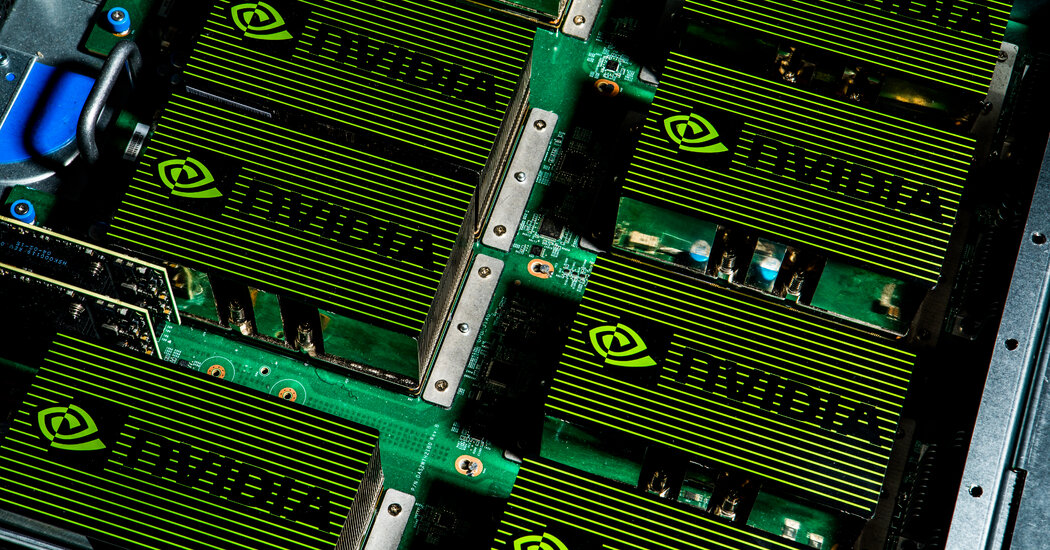
WASHINGTON — The Federal Trade Commission on Thursday sued to block Nvidia’s $40 billion acquisition of a fellow chip company, Arm, halting one of the biggest semiconductor industry deals in history, as federal regulators push to rein in corporate consolidation.
The F.T.C. said the deal between Nvidia, which makes chips, and Arm, which licenses chip technology, would stifle competition and harm consumers. The proposed deal would give Nvidia control over computing technology and designs that rival firms rely on to develop competing chips.
“Tomorrow’s technologies depend on preserving today’s competitive, cutting-edge chip markets,” said Holly Vedova, the director of the F.T.C.’s competition bureau. “This proposed deal would distort Arm’s incentives in chip markets and allow the combined firm to unfairly undermine Nvidia’s rivals.”
Federal antitrust regulators have promised greater scrutiny of mergers and a clamp down on monopolies in a push to reinvigorate competition in the economy. The action against the deal is the first major merger decision by the Federal Trade Commission under the leadership of Lina Khan, a critic of big corporate mergers and monopolies in technology. Ms. Khan is among a slew of top antitrust officials picked by President Biden to rein in the power of Silicon Valley giants.
The administration has also promised to break open gas, telecom and pharmaceutical markets to bring down consumer prices at the gas pump and for home internet and prescriptions. Last month, the Justice Department sued to stop Penguin Random House, the largest publisher in the United States, from acquiring its rival Simon & Schuster.
In a statement, Nvidia said it would contest the F.T.C. lawsuit. “We will continue to work to demonstrate that this transaction will benefit the industry and promote competition.”
The F.T.C. suit, if successful, would not have much financial impact on Nvidia or Arm. But it would be a blow to Nvidia’s ambitions to play a more central role in shaping the direction of the computer industry — particularly in the field of artificial intelligence.
Arm, a British company that the Japanese conglomerate SoftBank bought in 2016, licenses designs for microprocessors and other technology that other companies use in their semiconductors. Its technology has been wildly successful, providing the calculating functions in essentially all smartphones and many other devices. Arm recently estimated its technology is used in about 25 billion chips per year.
Nvidia, based in California, is a dominant provider of chips used to render graphics in video games, technology it has adapted in recent years to also power artificial-intelligence applications used by cloud companies and self-driving cars.
Jensen Huang, the company’s chief executive, has been pushing the company to become a broader, “full-stack” provider of computing technology. In April, for example, Nvidia said it was building an Arm-based microprocessor for servers used in data centers.
In announcing the deal in September 2020 to buy Arm, Mr. Huang said the combination would create a premier company for advancing A.I. technology. He also promised to operate Arm without any change to its business model, acting independently and treating all chip customers fairly.
Mr. Huang said at the time that artificial intelligence would set off a new wave of computing and that “our combination will create a company fabulously positioned for the age of A.I.”
But the deal was controversial from the start, with some of Arm’s big customers, like Qualcomm, worried about the heightened competition from Nvidia and the possibility of a rival gaining access to their confidential information.
The F.T.C. said the merger would give Nvidia access to sensitive information about its rivals, who license technology and designs from Arm.
“Licensees rely on Arm for support in developing, designing, testing, debugging, troubleshooting, maintaining and improving their products,” the F.T.C. said in a statement. “Arm licensees share their competitively sensitive information with Arm because Arm is a neutral partner, not a rival chip maker. The acquisition is likely to result in a critical loss of trust in Arm and its ecosystem.”
The vote to block the merger was unanimous among the F.T.C.’s commissioners, and an administrative trial for the lawsuit is scheduled for May 10, the agency said.
This is a developing story. Check back for updates.




